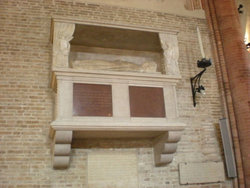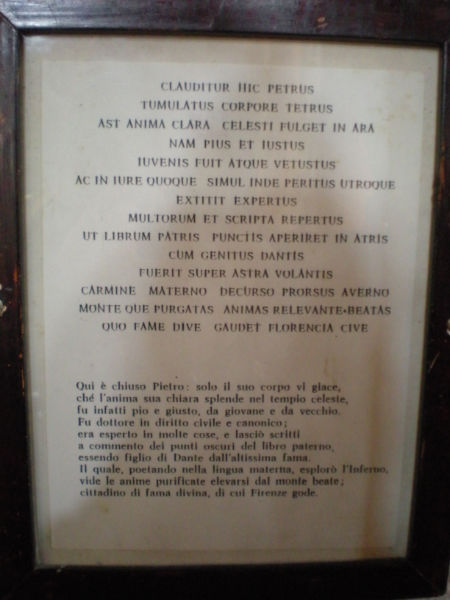in 1321 lived in Ravenna with his father.
In 1322 he was able to return to Florence, where he found the rough economic situation of the family. This is why in 1323 he wanted to study law at Bologna (funded by Cangrande della Scala ), where he doctorated, where he met Petrarch, who was a friend.
He then settled in Verona, in the Palazzo Bevilacqua , where in 1335 is remembered as a judge, in Vicenza , again as a judge, and Treviso, where he died in 1364 , "where he came to save his deposit by the failure of Agolanti, Florentine bankers "
He corresponded with Petrarch , and wrote lyric poems which show the understandably strong influence of his father. His major work is an influential Latin commentary on the Divine Comedy , which survives in three significantly different versions, dating from c. 1340, 1350–5, and c. 1358. In all three Pietro goes against contemporaries who saw Dante as an inspired visionary, and stresses his achievement as the author of a poetic fiction.
in 1321 lived in Ravenna with his father.
In 1322 he was able to return to Florence, where he found the rough economic situation of the family. This is why in 1323 he wanted to study law at Bologna (funded by Cangrande della Scala ), where he doctorated, where he met Petrarch, who was a friend.
He then settled in Verona, in the Palazzo Bevilacqua , where in 1335 is remembered as a judge, in Vicenza , again as a judge, and Treviso, where he died in 1364 , "where he came to save his deposit by the failure of Agolanti, Florentine bankers "
He corresponded with Petrarch , and wrote lyric poems which show the understandably strong influence of his father. His major work is an influential Latin commentary on the Divine Comedy , which survives in three significantly different versions, dating from c. 1340, 1350–5, and c. 1358. In all three Pietro goes against contemporaries who saw Dante as an inspired visionary, and stresses his achievement as the author of a poetic fiction.
Family Members
Advertisement
Advertisement






